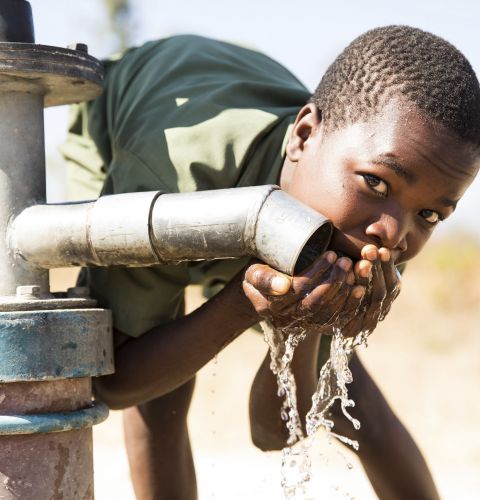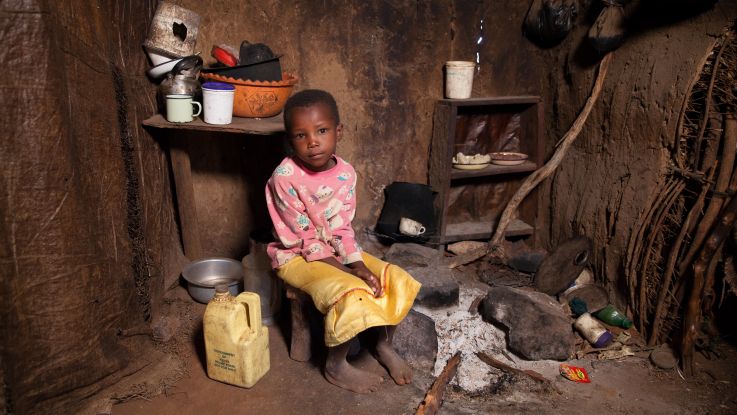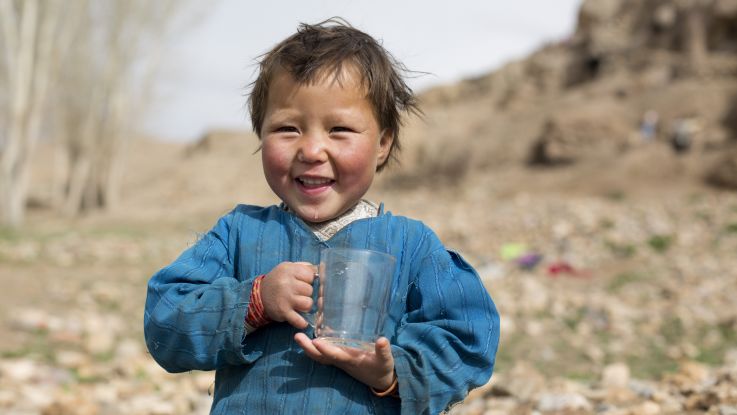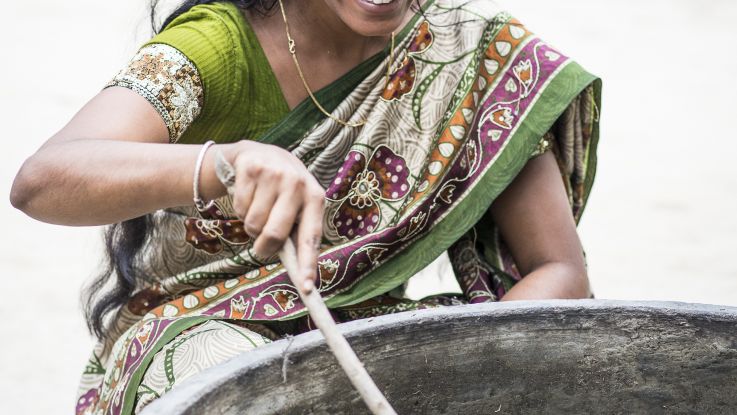Cholera and other waterborne diseases
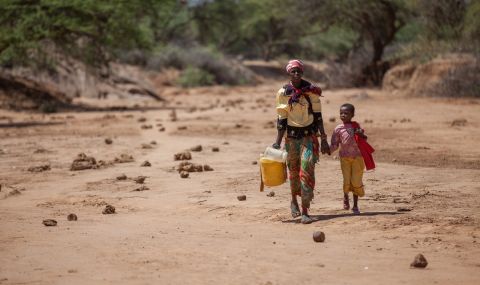
Consolata and her daughter Elizabeth carry jerry cans from a watering hole during drought in Kenya in 2017. Photo: Alice Oldenburg/ActionAid
Cholera and diarrhoea: what's the difference?
Cholera is an acute diarrhoeal disease that can kill within hours if left untreated.1
People living with poor sanitation are most at risk, making it a strong indicator of poverty and inequality. It can be a particular risk in emergencies when sanitation systems are inadequate or overwhelmed.
Cholera is caused by the ingestion of food or water contaminated with the bacterium called Vibrio cholera.2 It can cause fever, vomiting and watery diarrhoea. In its most severe form, people experience a sudden onset of acute watery diarrhoea that can lead to death by severe dehydration.
According to the World Health Organisation there are roughly 1.3 to 4 million cases worldwide each year, and 21,000 to 143,000 deaths.3
What is diarrhoea?
Diarrhoea is a common problem associated with poor hygiene and contaminated water. Diarrhoea is a symptom of cholera. In the worst circumstances it can be a killer. The loss of water and essential bodily fluids and minerals can rapidly weaken vulnerable people.
Where is cholera found?
Cholera is most widespread in regions with poor sanitation, like:
- sub-Saharan Africa
- south and south-east Asia
- the Middle East
- central America and the Caribbean.
Severe outbreaks of cholera often happen as a result of serious disasters like hurricanes, typhoons or earthquakes. This is because they disrupt existing water systems, resulting in drinking and waste waters becoming mixed.
Is there cholera in the UK?
A case of cholera has not originated in England and Wales for over 100 years, although occasionally travellers bring the infection back with them – six cases of cholera were reported in England and Wales during 2013/14.
How does cholera spread?
Cholera, like other waterborne diseases, can spread if food and, in particular, water become contaminated with the stools of an infected person. A very short incubation period of two hours to five days means cases can rise extremely quickly and turn into an outbreak.
Around 75% of people infected with cholera do not develop any symptoms. However, their faeces is infectious for 7 to 14 days and is shed back into the environment, where it could infect others. Cholera affects both children and adults and, unlike other diarrhoeal diseases, it can kill healthy adults within hours.
People with a weak immune system, such as malnourished children or people living with HIV, face a higher risk of dying if they catch cholera.2
Cholera can be easily treated with the quick intake of oral rehydration salts to replace lost fluids. However, if left untreated, cholera can kill quickly following the onset of symptoms, so promoting awareness and prevention methods is essential.
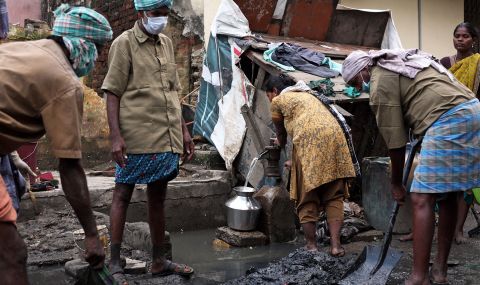
The aftermath of a flood in Tamil Nadu, India, in 2015. Photo: Srikanth Kolari/ActionAid
How ActionAid helps prevent cholera and other waterborne diseases
Sustainable, safe, clean water systems
Essential to the prevention of waterborne diseases such as cholera is making sure people have on-going access to safe, clean water.
That's why we provide this for communities. This might take the form of a well or borehole driven by a pump, which taps into the underground stores of water, or safe and clean tanks to store water at household level.
We also train people in the community how to monitor and fix any future problems, to make sure it can be a sustainable source of water for everyone for years to come.
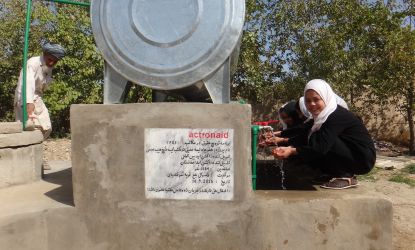
Clean water for students in Afghanistan
“ActionAid dug a well and provided us with a water tank," says 12-year-old Karishma from Afghanistan. "We can now drink cool, clean water whenever we like."
Karishma is among 1,081 students that attend her local high school. With no access to water, the school relied on their 62-year-old security guard, Mir Alam, to walk the 1km to a nearby canal to collect water for the students. Thanks to ActionAid child sponsorship, we were able to help.
Karishma says: “The water from the canal was not very clean, many of us missed lessons because we were suffering from diarrhoea, or worse, cholera. Thanks to the work of ActionAid and our teachers we can now have a drink without having to worry if we will become ill."
12-year-old Karishma collecting clean water from an ActionAid funded water tank at her school in Afghanistan, which helps reduce the risk of diseases like cholera
ActionAid
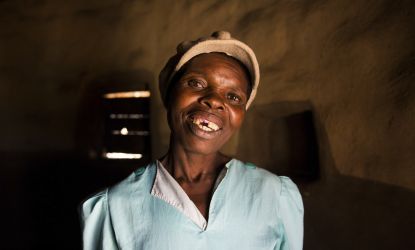
Alice, from Nyamaropa in Zimbabwe
Actionaid
The effects of clean water in Zimbabwe
Alice, from Nyamaropa in Zimbabwe suffered from typhoid during the 2014 outbreak. She was hospitalised and it took her two weeks to recover.
In response to the outbreak ActionAid dug a borehole, providing the community with clean safe water meaning they no longer have to drink dirty water from the Murozi River, preventing the risk of waterborne diseases like typhoid and cholera.
Since its construction, the number of cases of waterborne diseases in their community reduced to zero. Alice said villagers now follow all the guidelines to limit the spread of disease.
Prevention of water-borne diseases like cholera after emergencies
After a disaster or during conflict, the risk of cholera and other water-borne diseases increases dramatically.
Reduced access to clean water and sanitation creates the perfect conditions for cholera to develop, and lots of people cramped into small spaces such as shelters or refugee camps means the disease can spread very rapidly.
Giving out hygiene kits is therefore often a vital part of our response to humanitarian crises – from the Haiti earthquake in 2010 to the ongoing Rohingya refugee crisis.
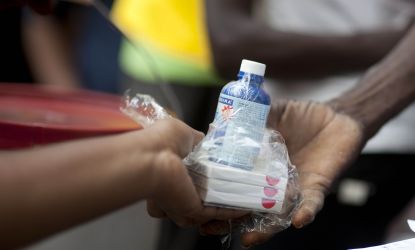
Cholera prevention kits after the Haiti 2010 earthquake
Following the devastating earthquake in Haiti in 2010, our local staff distributed hundreds of cholera prevention kits, including 290 kits to internally displaced people at Foyer Monfort.
Each kit contained:
- 1 x gallon of chlorine
- 6 x hydration packets
- 5 x bars of soap
- 1 x bottle of water purification solution
- 1 x roll of toilet paper
- 1 x cup
- 1 x bucket.
ActionAid Haiti staff distributing cholera prevention kits to internally displaced people at Foyer Monfort following the earthquake in 2010
Charles Eckert/ActionAid
Hygiene and handwashing
Another reason diseases such as cholera can spread very quickly is if communities do not have a culture of washing their hands, especially in crowded places such as schools.
ActionAid supports health education projects throughout the community – providing promotional materials and training about the importance of handwashing to stop the spread of diseases, as well as the equipment itself.
Footnotes
- 1http://www.who.int/mediacentre/factsheets/fs107/en/
- 2 a b WHO (2017), Cholera
- 3WHO (2017), Media Centre factsheet: Cholera
Page updated 14 February 2023

